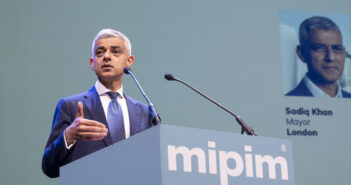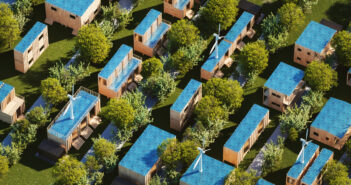Professor Ariella Masboungi, Architecture and Urban Planner, lead a panel on how cities benefit from hosting major international sporting events at MIPIM 2017. Paris’ 2024 Olympic bid was the main topic of discussion. Professor Masboungi explained how hosting an Olympics can give a city a jump start on urban planning, but the process needs to be done correctly. Too often cities do not think long term enough when hosting major sporting events.
Hanna Gronkiewicz-Waltz, Mayor of Warsaw, was the first to address how her city has used sporting events to help city development. Warsaw played host to the 2012 Euro (European football championship). The creation of the National Stadium in Warsaw helped to continue Warsaw’s urban development plan. Gronkiewicz-Waltz explained that the stadium gave the city the ability to construct the second half of the urban metro plan. Finishing the metro was just one reason citizens of Warsaw were in support of hosting the 2012 Euro. The stadium also helped to increase tourism revenue by 15%. This set Warsaw on a path to continue to increase its infrastructure and provide a sound urban development for its citizens. There is now a 2030 housing policy in place to help increase home development for the citizens of Warsaw. Gronkiewicz-Waltz stated that hosting the 2012 Euro has been a huge boost to Warsaw’s economy and urban development.
Jean-François Martins, Sports tourism for Paris, discussed Paris’ 2024 Olympic bid and specifically if the city and its citizens would benefit from hosting the Olympic Games. In the past cities have built infrastructure for the Games not focused long term. London 2012 was a good example of how infrastructure was used effectively post Olympics. Martins stated that cities must focus their urban planning at least 10 years in advance if they wish to use Olympic infrastructure effectively after the Games. Host cities are awarded the Olympic bid seven years before the games. The planning must begin and start to be incorporated into the city’s plan even before the Olympic bid is won. Martins explained that Paris’ 2024 bid revolves around providing a high-level city for the city’s youth, addressing housing issues, and addressing energy concerns. Martins feels that the Olympic Game’s plan needs to correspond to the city’s master plan. Without these two in accordance Paris will not help solve the three issues addressed above. It takes strategic planning to implement Olympic infrastructure for the long-term benefit of a city.
Patrick Braouezec, President of Plaine Commune, discussed the legacy Paris 2024 should leave behind for its city and citizens. He addressed how the Olympic plan should help to add value for the things Paris is lacking. Specifically, he referred to using the Olympic swimming pools as public pools in Paris post Games. Braouezec explained that he had journeyed around the world looking at different Olympic villages. They are all very similar and the model needs to be rethought. « The village just provides accommodation, it does nothing to help create an urban development that can be used by citizens’ post Games. »
« The village just provides accommodation, it does nothing to help create an urban development that can be used by citizens’ post Games. »
Braouezec suggested incorporating office, and potential mixed-used space into Olympic villages of the future. He defined it more as an Olympic ‘district’, which would have many more aspects so citizens could use the village in a much more functional way post Games. The goal of hosting the Olympic Games or international sporting events is for the city’s citizens to benefit in the long-term – accomplished through better planning and foresight of urban development.



